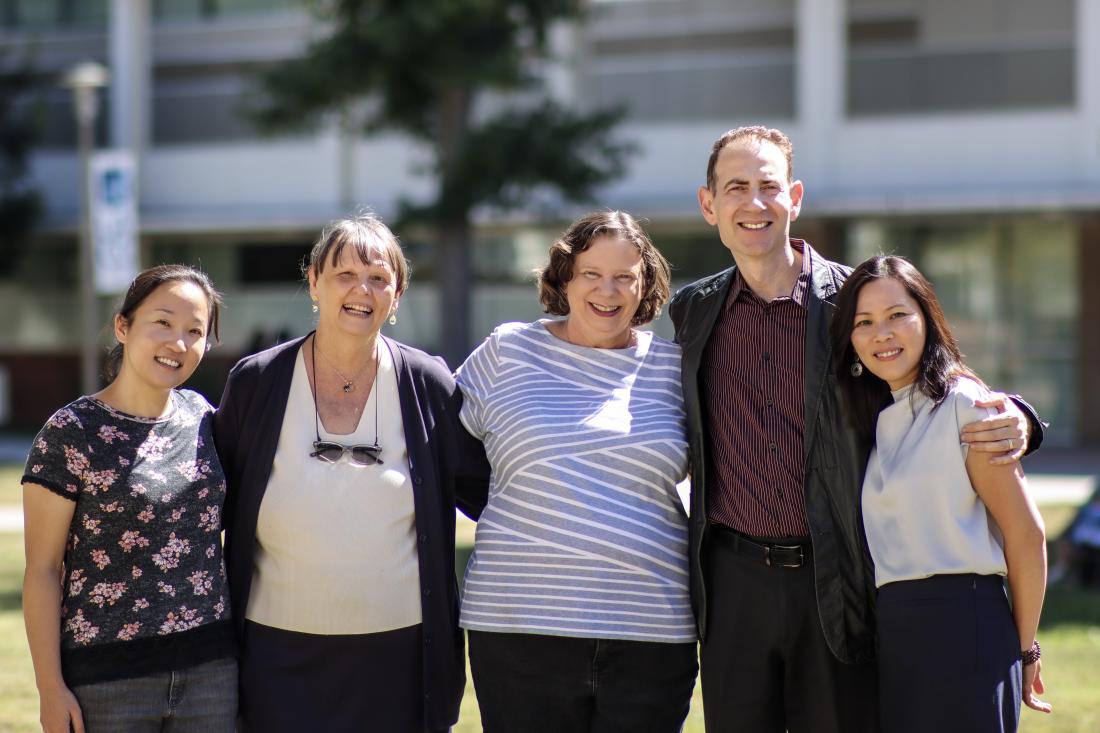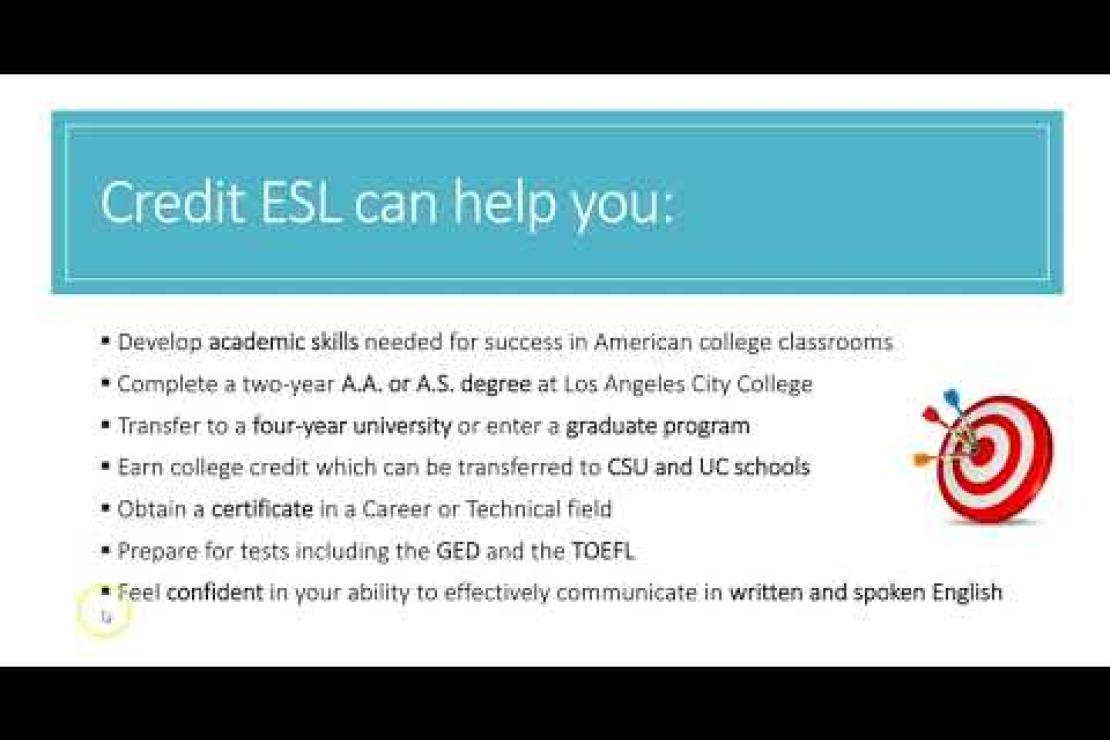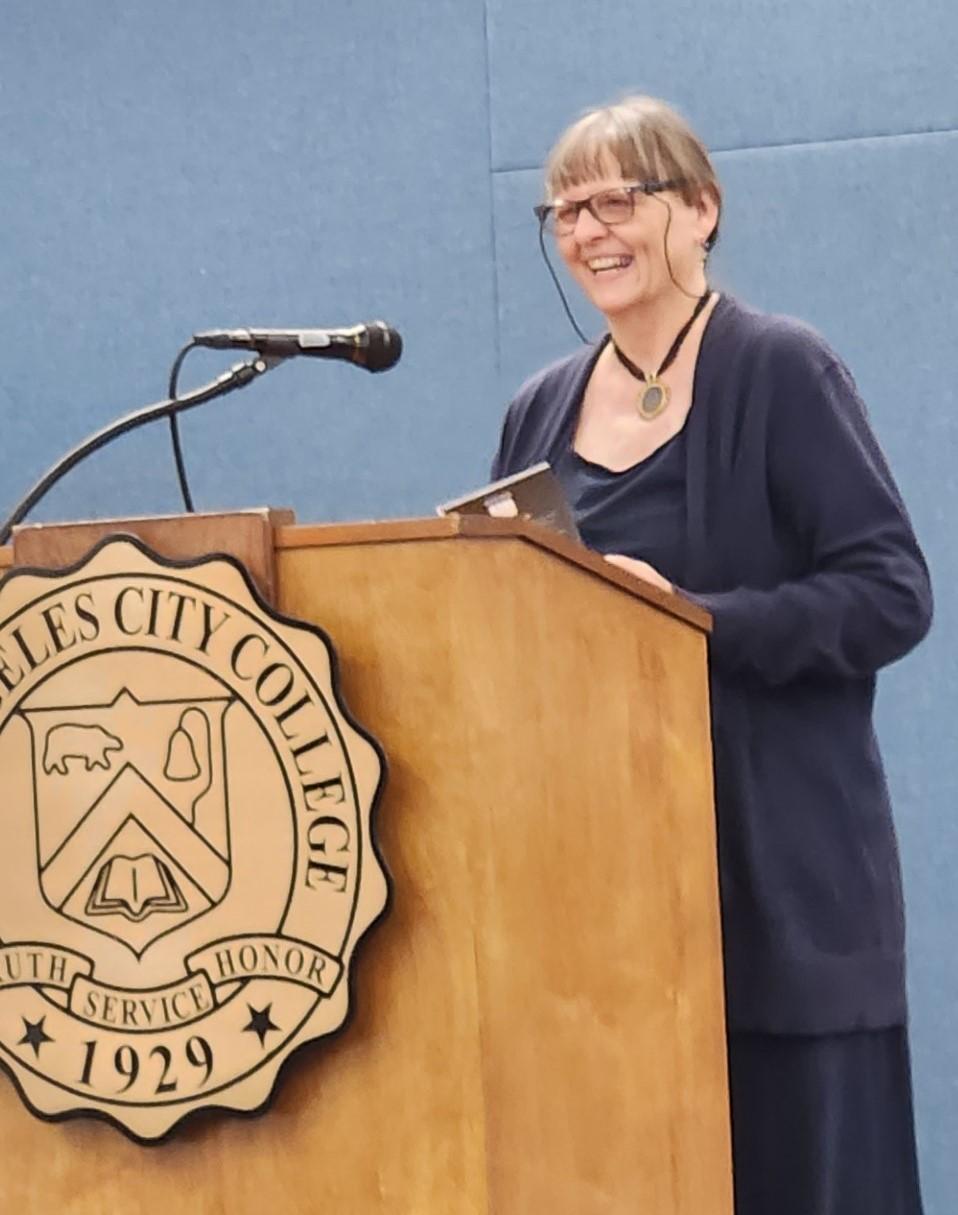Welcome to LACC's Credit ESL Program!
The English & ESL Department offers a comprehensive Credit ESL Program for students whose native language is not English. Our program serves a variety of students from different language and cultural backgrounds. Our 6-level reading, writing, listening and speaking sequences prepare students for skills that are needed for both academic and professional work. We provide quality instruction and supportive student services to help students meet their personal goals.
Our classes range from low-intermediate to high-advanced. Our highest level course (E.S.L. 110) is equivalent to first-year university-level English. We offer flexible morning and evening schedules. Students can attend classes both in-person on our campus and on-line via Zoom.
Learn English as a Second Language
Watch this informative video to learn more about the Credit ESL Program at Los Angeles City College. Click on CC to read the captions as you view it.
Hello, this is an introduction to credit ESL program at Los Angeles City College, LACC.
Welcome to LACC Credit ESL. We are happy that you're here and checking out our website. The purpose of credit ESL is to prepare students for their future academic studies and professional careers. Whether you are new to this country or have been living here for a long time, we want you to polish your English skills to achieve your goals.
Our program starts at Level 3, which is for low-intermediate students who speak, read and understand some English. We offer levels three, four, five, six, eight, and E.S.L. 110, which is an English 101 equivalent transfer level course.
There are several things that Credit ESL can help you achieve. You can develop academic skills that are needed for success in American college classrooms. You can complete a two-year AA or AS degree at Los Angeles City College. Many of our ESL students receive an associate degree in programs like child development, nursing or dental program. You can also transfer to a four-year university. Or you can enter a graduate program if you already have a bachelor's degree from your home country. Most of our ESL courses offer college credit, which can be transferred to CSU and UC schools. You can also obtain a certificate in a career or technical field. Some of our students take credit ESL courses to prepare for tests, including the GED and the TOEFL. Overall, you can become more confident in your ability to effectively communicate in written and spoken English.
We have guided self placement GSP available at LACC, so you can receive a level placement recommendation in case you're wondering what level might be appropriate for you. The best way to do this is to visit the website and click the link at Credit ESL Placement down below on this page. You can also visit in person at General Counseling in Student Services Building on the second floor. Their phone number is 323-953-4000 extension number 2361. You can also email them at assessment@LAcitycollege.edu
These are the Credit ESL courses we offer. As you can see here, our courses start at level three, which is low intermediate, and goes all the way to level eight, high advanced and then the highest level is E.S.L. 110, which is an English 101 equivalent transfer level course. By the way, A courses are our core classes focused on writing and grammar. B courses are reading and vocabulary. C courses are listening and speaking.
Credit ESL students can receive financial aid for tuition, textbooks and other needs. You can learn more about it at LACC Financial Aid Office website and also Extended Opportunity Program and Services (EOP& under Student Services tab on LACC homepage.
Are you ready to take the next step? Please navigate through our website and links carefully to learn more about Credit ESL. If you have any questions, contact us at the information at the bottom of this page. We are located in Jefferson Hall, Room 301 on the third floor. Thank you and we hope to see you soon.

Is Credit ESL for you?
Our Credit ESL Program emphasizes academic language instruction. It prepares students for:
- Certificate and degree programs
- Transfer to a 4-year university
- Vocational certificates
- Language skills needed to obtain a GED
- Advancement in jobs or careers
Students may quality for financial aid and work study when taking LACC's Credit ESL classes.
Finding Your Level
If you are a new ESL student, the Guided Self-Placement (GSP) process will help you find the appropriate level within the Credit ESL course sequence (E.S.L. 3, 4, 5, 6, 8, and 110) based on your English language proficiency. The GSP process consists of two parts:
- Guided Self-Placement Survey - You will answer a set of questions about your English language background and skills. (10-20 minutes)
- ESL Writing Assessment - You will have 45 minutes to write a composition based on a writing prompt.

Credit ESL Course Sequence
| Required Courses | Highly Recommended Courses | ||
|---|---|---|---|
| Level | Writing and Grammar | Reading and Vocabulary | Listening and Speaking |
| Low-Intermediate | ESL 3A | ESL 3B | ESL 3C |
| Intermediate | ESL 4A | ESL 4B | ESL 4C |
| High-Intermediate | ESL 5A | ESL 5B | ESL 5C |
| Low-Advanced | ESL 6A | ESL 6B | ESL 6C |
| Advanced | ESL 8 | ||
| Transfer | ESL 110 | ||
ESL Levels Offered at LACC
At this level, low-intermediate ESL students:
-
Learn how to write paragraphs based on readings, class discussions, and familiar topics.
-
Study word order, sentence structure, parts of speech, and basic verb tenses to build a foundation in English grammar.
-
Read short texts to develop reading comprehension skills and learn new words.
-
Develop listening, speaking, and pronunciation skills to communicate effectively in school, work, and social settings.
Note: E.S.L. 3A (Writing and Grammar) is for students who speak, read, and understand some English and now want to develop their writing skills.
Reading Level: Students at this level read at least 5-10 pages per week. This is an example of a Level 3 reading text:
“Everyone knows that a college student’s life isn’t easy. Most students take four or five classes each semester. Students must study, do homework, and take tests for every class. They have very busy schedules. But for some students, their schedules can be even more difficult. In the United States, 80 percent of all college students work either part-time or full-time while they are in college. Jobs can be important for college students. Of course, students earn money, but jobs can teach students other things, too. Students can get a lot of experience from their jobs. Students who work can also learn how to spend and save their money carefully. This experience can help them after they graduate from college.” (Reading for Today 2: Insights)
Grading Policy: Students enrolled in E.S.L. 3A, 3B, and 3C receive Pass/ No Pass grades.
At this level, intermediate ESL students:
-
Compose, revise, and edit effective academic paragraphs and short essays.
-
Improve their ability to write well-formed sentences, use verb tenses accurately in context, and choose appropriate vocabulary to convey their ideas.
-
Read and respond to a variety of texts to improve their comprehension and expand their vocabulary.
-
Develop listening, speaking, and pronunciation skills to understand short lectures and participate in class discussions.
Reading Level: Students at this level read at least 10-15 pages per week. This is an example of a Level 4 reading text:
“When we dream about the future, many of us like to think that we will be able to exit our garages and take to the skies in our own personal flying car. The advantages are obvious. This technology would allow three-dimensional freedom of movement. We could fly at 480 kilometers (about 298.26 mi) per hour, avoiding traffic lights, busy roads, and speeding tickets. However, some people point to the disadvantages of flying cars. They claim that there are certain to be problems with traffic control. If flying cars become popular, there is likely to be a problem with air traffic congestion. Another big problem is mechanical failure. What will happen if the cars break down? These are problems we must expect if flying cars become a reality.” (Prism 2: Reading & Writing)
Grading Policy: Students enrolled in E.S.L. 4A, 4B, and 4C receive Pass/ No Pass grades.
At this level, high-intermediate ESL students:
-
Compose, revise, and edit academic essays with multiple paragraphs.
-
Utilize complex sentence structures, active and passive verb tenses, and paraphrasing techniques to effectively and confidently express themselves in writing.
-
Expand their vocabulary to successfully understand and respond to academic texts.
-
Develop listening, speaking, and intonation skills to understand academic lectures, participate in class discussions, and give presentations.
Reading Level: Students at this level read at least 15-20 pages per week. This is an example of a Level 5 reading text:
“With new technology, scientists can now predict some natural disasters like hurricanes. Satellites, for example, show large storms as they develop over oceans. Earthquakes, on the other hand, are much more difficult to predict. Many scientists believe that it is only possible to predict where an earthquake is likely to happen. They do not believe that it is possible to predict the precise date and time of an earthquake. Scientists know that there are often small movements, or tremors, which shake the earth before a major earthquake. It is possible that animals may feel these movements and begin to act strangely. However, these tremors are not always followed by an earthquake. In the future, scientists hope to be able to more accurately predict earthquakes and provide advance warning.” (Making Connections 1)
Grading Policy: Students enrolled in E.S.L. 5A, 5B, and 5C receive letter grades (A, B, C, D, or F).
Transfer Credit: CSU
At this level, low-advanced ESL students:
-
Compose, revise, and edit extended essays incorporating outside readings.
-
Practice paraphrasing, summarizing, and quoting sources with proper in-text citations.
-
Develop critical reading skills to prepare for college-level coursework in English and other academic subjects.
-
Refine listening, speaking, and intonation skills to analyze lectures, participate in academic discussions, and give extended presentations.
Reading Level: Students at this level read at least 20-25 pages per week. This is an example of a Level 6 reading text:
“During childhood, sisters and brothers are a major part of each other’s lives for better or for worse. As adults, they may drift apart as they become involved in their own careers, marriages, and families. Critical events can bring siblings together or deepen an existing rift, according to a study by psychologists Helgola Ross and Joel Milgram of the University of Cincinnati. Parental sickness or death is a prime example. Ross and Milgram found that siblings immersed in rivalry and conflict were even more torn apart by the death or sickness of a parent. However, those siblings who had been close since childhood became closer. In later life, with retirement, an empty nest, and parents and sometimes spouses gone, brothers and sisters often turn back to each other for a special affinity and link to the past." (Topics for Today 5)
Grading Policy: Students enrolled in E.S.L. 6A, 6B, and 6C receive letter grades (A, B, C, D, or F).
Transfer Credit: CSU
At this level, advanced ESL students:
-
Compose, revise, and edit formal academic essays which summarize, analyze, and synthesize outside sources.
-
Conduct basic library research and use MLA citations.
-
Write essays based primarily on critical reading, interpretation, and analysis.
Note: E.S.L. 8 prepares students for E.S.L. 110 or English 101 with instructions on written composition, advanced grammar skills, and critical thinking skills.
Reading Level: Students at this level read at least 25-30 pages per week. This is an example of an E.S.L. 8 reading text:
“Scientists have long known that specific genes are associated with a number of serious diseases and birth defects. Scientists have used this knowledge to develop tests to identify defective genes, which are the result of ‘mutation,’ a natural process that alters the genetic material. Researchers have identified a large number of genes that are responsible for life-threatening conditions, such as cystic fibrosis, a disease that shortens people’ lives by attacking their lungs, and Huntington’s disease, a fatal brain condition. Once these genes are identified, genetic tests for many such diseases become available. These tests can indicate if a person has a specific defective gene. By 2011, researchers had developed more than 2,000 genetic tests, which allow doctors to inform patients if they have inherited these genes and if they risk passing them on to their children.” (Making Connections 3)
Grading Policy: Students enrolled in E.S.L. 8 receive letter grades (A, B, C, D, or F).
Transfer Credit: CSU, UC
At this level, transfer-level ESL students:
-
Compose, revise, and edit college-level essays that are well-focused, coherent, logically organized, and thoroughly developed.
-
Conduct library and online research, evaluate primary and secondary source materials, and integrate synthesized material into written essays using appropriate MLA citations.
-
Proofread and edit essays to achieve effective academic written communication.
Note: This English composition transfer-level course is equivalent to English 101. Designed for non-native English speakers, the course emphasizes preparing students for the writing and critical reading demands across academic disciplines.
Reading Level – Students in this class read at least 30 pages per week. This is an example of an E.S.L. 110 reading text:
“The chimpanzee is more like us, genetically, than any other animal. It is because of similarities in physiology, in biochemistry, in the immune system, that medical science makes use of the living bodies of chimpanzees in its search for cures and vaccines for a variety of human diseases. There are also behavioral, psychological, and emotional similarities between chimpanzees and humans, resemblances so striking that they raise a serious ethical question: are we justified in using an animal so close to us – an animal, moreover, that is highly endangered in its African forest home – as a human substitute in medical experimentation?” (World of Reading 3)
Grading Policy: Students enrolled in E.S.L. 110 receive letter grades (A, B, C, D, or F).
Transfer Credit: CSU (CSUGE Area A2); UC (IGETC Area 1A); Meets Written Expression Competency
ESL To English Sequence
After completing E.S.L. 8, students may register for either E.S.L. 110 (College Composition for Non-Native Speakers) or English 101 (College Reading and Comprehension I). Both E.S.L. 110 and English 101 fulfill the requirements to obtain an AA-T or AS-T degree at Los Angeles City College.

ESL Milestone Certificates of Achievement
The ESL Milestone Certificates of Achievement are designed to prepare English language learners for the rigor of academic coursework as they embark on programs of study leading to associate degrees, transfer to universities and graduate programs, and professional careers. Students completing the ESL Milestone Certificates have demonstrated achievement of academic English skills at an advanced, post-secondary level.
Meet Our Professors
Visit this page to read profiles of our faculty members.


ESL Lab
The ESL Lab, located in Jefferson Hall 318, provides individual tutoring and writing support for students in all ESL classes. All hours are both in-person and online unless noted.
Fall & Spring
Monday: 12:00PM - 5:00PM
Tuesday: 12:00PM - 7:00PM (5:00PM-7:00PM online only)
Wednesday: 12:00PM-5:00PM
Thursday: 12:00PM-5:00PM
Friday: 10:00AM-2:00PM (online only)
Winter & Summer: Closed
Scholarship Opportunities
Each spring, the English & ESL Department awards several scholarships to deserving ESL students. The recipients are honored at our annual Awards Ceremony held in May.
Have a Question About Credit ESL?
Get Help on Zoom
For students not on our LACC campus, we invite you to log into Zoom to ask us any questions you may have about our program, classes, and services.
Mondays to Fridays: 8:30AM to 11:00AM and 1:00PM to 3:00PM

English & ESL Department
Office Hours and Location
Mondays to Thursdays: 8:00AM - 4:00PM
Fridays to Sundays: Closed
We are located on the 3rd floor of Jefferson Hall in room JH 301.
Contact
Jeffrey M. Nishimura, Department Chair
Email: @email
Phone: (323) 953-4000 ext. 2706
The Chair usually attends meetings in the afternoon, so please call before you come.
Jasminee Haywood-Daley, Secretary
Email: @email
Phone: (323) 953-4000 ext. 2700



